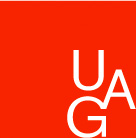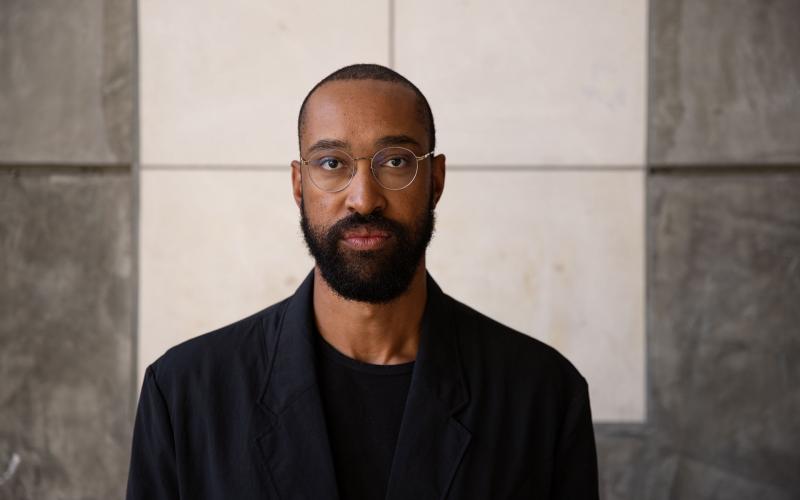Coleman Collins: Artist, Writer, Educator
By Mia Hammett
In July, the Department of Art welcomed new Assistant Professor Coleman Collins to the faculty. As an artist, writer and educator, Collins specializes in multiplicities of meaning. His work takes advantage of both visual and tactile materials to interrogate the combined elements of history, biology, and technology. Informed by critical theory, black studies, and psychoanalysis, his work also contends with binary oppositions of image and object; harm and reparation; and inheritance and obligation.
Collins explores the translation and transmission of information through material and linguistic forms. His work delves into how information can manifest physically and be received virtually from a singular source. Additionally, he examines how expressions of certain material forms are only ever received in language; and how those very transmissions can be reversed, disrupted, and otherwise manipulated.
Collins earned his M.F.A. in New Genres from UCLA in 2018. He was a 2017 resident at the Skowhegan School for Painting and Sculpture in Madison, Maine; a 2019 participant of the Whitney Museum’s Independent Study program in New York; a 2021 recipient of a NYFA Artists’ Corps Grant; a 2022 IDEA Fellow at Stony Brook University’s Future Histories Studio; and a 2022 recipient of a Graham Foundation research grant.
His recent exhibitions and screenings have taken place at Ehrlich Steinberg in Los Angeles; the Palestine Festival of Literature in Jerusalem/Ramallah; Larder in Los Angeles; Hesse Flatow in New York; the Carré d’Art in Nîmes, France; Kunsthalle Wien, Vienna; and Artspace, New Haven. Collins has also had solo exhibitions at Brief Histories in New York and Nothing Special in Los Angeles. His work has been featured in Art in America Magazine, and his short story “Dive” was included in a recent MIT Press publication, Sibyl’s Mouths.
Collins is one of four faculty hired into the Poetic Justice cluster—part of UCI’s Black Thriving Initiative. Supporting the vast creative output of black Southern Californians, the cluster seeks to strengthen connections between UCI and community-oriented institutions that actively preserve black history, art, and culture.
Artistic Instruction
As assistant professor, Collins looks forward to getting to work closely with both undergraduate and graduate students.
“I've heard that the students are quite strong and committed to conceptual inquiry, and I'm excited to have the opportunity to work with them,” said Collins. Here, the “conceptual inquiry” goes both ways; Collins’ use of a variety of media (video, sculpture, installation, print, digital and performance art) is itself testament to his many creative forms of intellectual engagement.
Along with his newly earned position, Collins hopes to continue growing as an artist and educator.
“I want to continue to push my own practice, and more importantly I hope to form lasting connections with the students. The two goals are not opposed; each informs the other. I find that teaching can be immensely helpful to my own process of articulation,” said Collins.
In considering how his work has changed form, energy, or purpose in recent years, Collins acknowledges that it’s become more acutely physical.
“My work has begun to get more and more material and embodied of late; this shift is, I think, informed by my own growing preference for embodiment and presence, as asynchronicity and virtuality slowly and steadily encroach on all aspects of our lives,” said Collins.
Whereas writing specifically affords Collins the means to articulate with precision, “the more visual and material aspects of my practice attempt to stretch toward concepts that can’t quite be expressed in words.” Writing and visual art, then, offer Collins a necessary creative bifurcation; while not mutually exclusive in form, character, or capability, each medium intellectually and formally complements the other.
Collins is part of Ehrlich Steinberg’s inaugural exhibition Atavism for the Future, a group show featuring ten artists, on view from Nov. 10 to Dec. 23. The exhibition engages with the cultural and political histories of archetypes and their inherited presence in the so-called ‘art object,’ with regard to its changes in significance. Starting Jan. 20, 2024, Collins will also have work on exhibit at London’s Herald Street gallery.
“Right now, I’m preparing for a solo show at Ehrlich Steinberg in February, as well as creating some new works for group exhibitions that will take place in Los Angeles, New York, and London in the next few months. I also have some longer-term writing projects that I’m working on.”
To read more about Coleman Collins and his work, visit his Department of Art bio page here, or his personal website at www.colemancollins.info.

